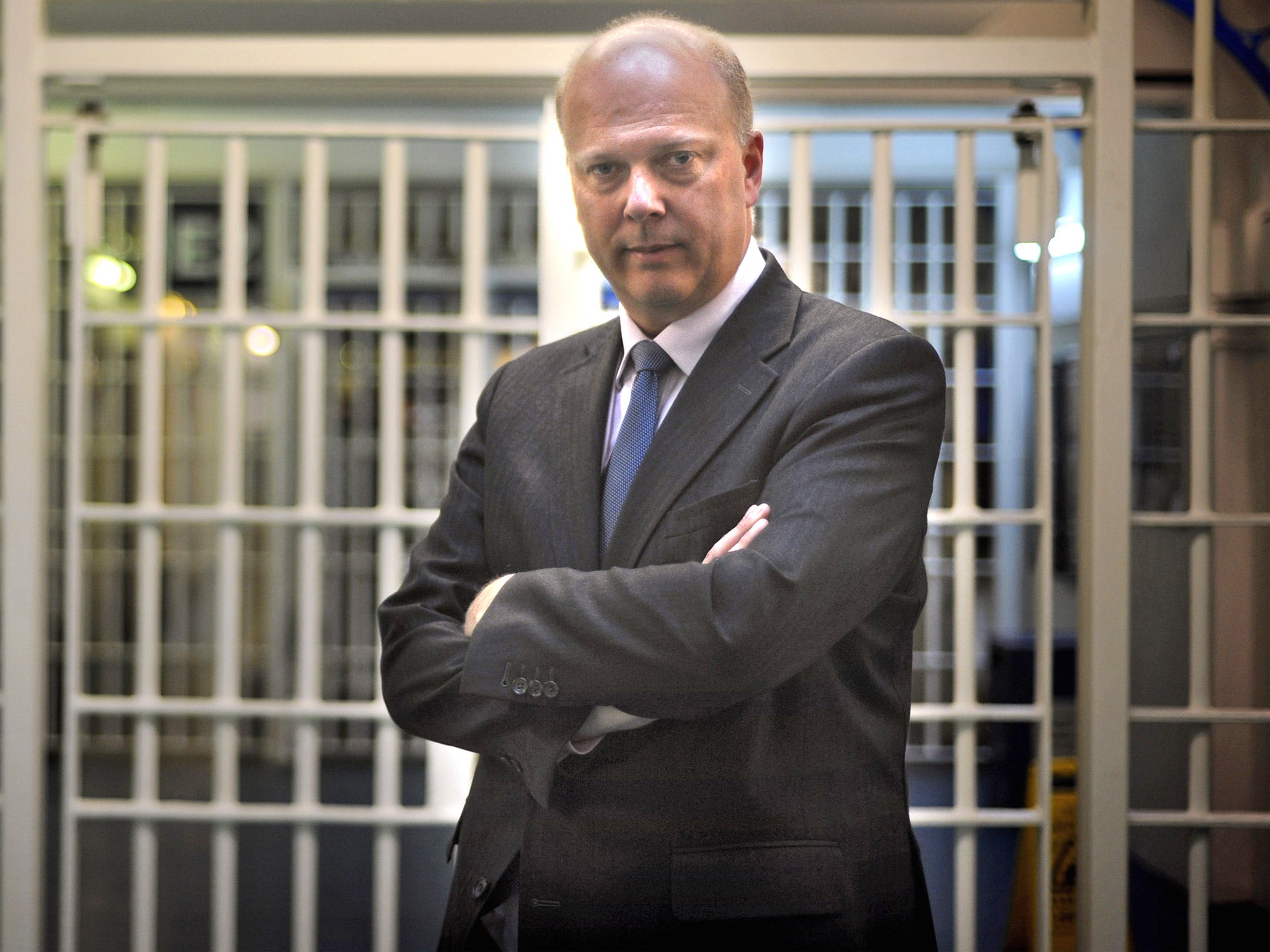Rising numbers of suicides in jails linked to spending cuts
Justice Secretary Chris Grayling is accused of presiding over a full-blown crisis in the country’s prisons

Your support helps us to tell the story
From reproductive rights to climate change to Big Tech, The Independent is on the ground when the story is developing. Whether it's investigating the financials of Elon Musk's pro-Trump PAC or producing our latest documentary, 'The A Word', which shines a light on the American women fighting for reproductive rights, we know how important it is to parse out the facts from the messaging.
At such a critical moment in US history, we need reporters on the ground. Your donation allows us to keep sending journalists to speak to both sides of the story.
The Independent is trusted by Americans across the entire political spectrum. And unlike many other quality news outlets, we choose not to lock Americans out of our reporting and analysis with paywalls. We believe quality journalism should be available to everyone, paid for by those who can afford it.
Your support makes all the difference.Growing levels of suicide, self-harm and violence behind bars are linked to deep spending cuts to the prison system, a damning parliamentary report concludes today.
Specialist “riot squads” are now being sent to jails every other day to quell unrest, leading to accusations that Chris Grayling, the Justice Secretary, is presiding over a “full-blown crisis” in prisons.
Following a lengthy investigation, the Justice select committee registered “grave concern” over the seven-year high in suicide levels and the rising numbers of assaults on prisoners and staff.
The MPs said money-saving changes to the prison system in England and Wales, as well as tougher jail regimes ordered by Mr Grayling, had “made a significant contribution to the deterioration in safety”.
They also connected falling numbers of prison officers following redundancy programmes to the upsurge in violence in prison and said: “The Government failed to plan adequately for the risks inherent in staffing shortages and responded sluggishly when the problems they cause became apparent.”
The MPs pointed out that stricter rules on prisoners earning incentives had coincided with the jail population climbing to more than 85,500. And they signalled their dismay that numbers of offenders held in overcrowded conditions was still rising in spite of the Government’s efforts to create more prison spaces. Sir Alan Beith, the committee’s chairman, called for a “political and media debate which focuses on the three things people care about – evidence of what works, public safety and the effective use of taxpayers’ money”.
Juliet Lyon, director of the Prison Reform Trust, said: “Written in moderate terms, this devastating report is a powerful indictment of this Government’s complacent and dismissive attitude to rapidly deteriorating standards and safety in our prisons over the last two years.”
The Prisons Minister, Andrew Selous, said: “Our modernisation programme has created an estate fit for purpose and saved the taxpayer millions of pounds. Staffing levels were agreed with both prison governors and the unions at the outset and they have done an excellent job during a period when the prison population has unpredictably risen.”
Mr Grayling was challenged in the Commons over figures showing the National Tactical Response Group, which is composed of specialist officers trained to handle disturbances, was called into action 223 times last year – nearly twice as often as in 2010.
The shadow Justice Secretary, Sadiq Khan, said: “We have fewer prisons, with fewer staff and not enough work or training for inmates. “We have record numbers of deaths in custody and prisoner-on-prisoner and prisoner-on-staff assaults have surged. We heard a lot in 2010 about a rehabilitation revolution, where did it go wrong?”
Mr Grayling said: “We will go into this election with 3,000 more adult male prison places than in 2010.”
Case studies: Prison failings
Amy Friar was 24 when she was found hanging in her cell at HMP Downview in March 2011. A mother of one, she had a long history of mental health problems and self-harm. Her father committed suicide when she was young and she had been a victim of rape and domestic violence. An inquest into her death identified serious issues in relation to suicide and self-harm procedures and the quality of checks on vulnerable prisoners.
Mahry Rosser was 19 when she was found unconscious in her cell at HMP New Hall in April 2011. Ms Rosser had a long history of self-harm and suicide attempts. She grew up in South Wales and lived with her grandmother from the age of three.
At 16, she was detained at a children’s home and later was sentenced to three years’ detention for robbery. She was transferred to HMP New Hall in 2010. During her time at HMP New Hall, Rosser had consistently told staff of her distress at being too far away from her family to receive visits and her desire be transferred to Eastwood Park to be closer to them.
The Prison and Probation Ombudsman investigation report stated that there was a systemic failure in her care and she was transferred around the women’s estate without adequate regard for her needs.
Join our commenting forum
Join thought-provoking conversations, follow other Independent readers and see their replies
Comments